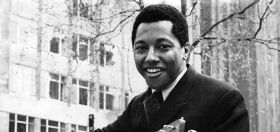
Welcome to Curtain Call, our mostly queer take on the latest theater openings on Broadway and beyond.
The Rundown
Playwright Michael McKeever’s new play Mr. Parker is getting a lot of buzz thanks to its well-publicized nudity and the use of Yondr pouches to sequester audience members’ phones like the ones used at Take Me Out, starring a famously naked Jesse Williams.
But what you can’t lock away — and what’s best experienced live in a theatre rather than trolled across social media — is the grief, resiliency, and healing that comes after losing a loved one.
After the sudden death of Jeffrey, his partner of 30 years, and a night of heavy drinking several months later, Terry Parker (Derek Smith) wakes up with Justin, a 28-year-old bartender/Uber driver (Davi Santos) in his deceased husband’s former East Village art studio. A relationship of sorts develops, much to the dismay of Parker’s sister-in-law Cassandra (Mia Matthews), who’s intent on preserving her brother’s estate.
How about we take this to the next level?
Our newsletter is like a refreshing cocktail (or mocktail) of LGBTQ+ entertainment and pop culture, served up with a side of eye-candy.
Related: Don’t miss these 16 LGBTQ theatrical events of the summer

No Tea, No Shade
The fleeting flesh in Mr. Parker is a purposefully awkward moment that most sexually active queer men have experienced at one point. The morning after a hook-up, you find yourself in the company of a relative stranger, asking if he can use the new toothbrush found in your medicine cabinet.
The morning-after turns into weeks for Terry and Justin, as the unlikely pair with a 25-year age difference finds commonality in their quest for intimacy. The expected differences emerge. Justin recalls an ex who wasn’t thrilled to find out he was on Grindr:
“It’s like just because you date them, you owe them something,” Justin explains to Terry. “Like monogamy.”

Terry still has a telephone landline at the studio (for reasons that later become apparent) and gets rattled at Justin’s constant texting. They enjoy fancy dinners at Blue Hill and Chinese takeout. Yet, Terry keeps the relationship at arm’s length, only allowing Justin to visit the art studio, not the couple’s Upper West Side Ansonia apartment.
McKeever keeps the plot moving along with Cassandra’s arrival and the prospect of a retrospective of her brother’s work at The Whitney. The only problem is that Terry controls the estate and his mourning has immobilized his ability to close the deal. The meaning of art fleetingly comes into question as the pair argues about the relevance of Jeffrey’s most prolific work — ironically, a series of large-scale cellphone photographs.
David Goldstein’s scenic design aptly captures a New York City fifth-floor walk-up, meticulously stocked with a lifetime of art supplies, vinyl albums, and other bits of a fully lived life. Combined with transitional music and sound design by Max Silverman, Mr. Parker takes on an almost ethereal quality as Terry occasionally breaks from the action to address the audience.

Let’s Have a Moment
Power plays an interesting role in Mr. Parker: who has it, when and why. We see the old guard through Terry’s eyes — previously half of a white cis gay power couple deeply embedded in New York City’s art scene. Justin, a millennial stuck in the gig economy hamster wheel, shows little interest in labels or commitment, while Cassandra, the sharpest of the three, has the business acumen to preserve her late brother’s legacy. Their shifting interactions provide scaffolding for Terry’s reawakening.
“Look. At this point, I admit I don’t know what this is. I really don’t. But, at the same time, I’m willing to sit back and enjoy it,” says Terry in a heated exchange with his sister-in-law. “… I’m happy, Cassandra. Why can’t that be enough?”
The Last Word
An old message reveals why Terry is reluctant to get rid of the answering machine. It’s from his husband — nothing spectacular, just that he’s running late for a dinner reservation and will meet him at the restaurant: “Just go on without me, you’ll be fine. I love you.”
Mr. Parker shows us that letting go of the dead — or the living — is not for the faint of heart.
Mr. Parker plays through June 25th at Theatre Row in New York City.


















